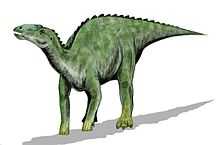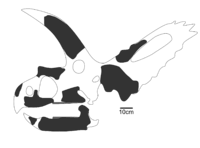Cerro del Pueblo Formation
| Cerro del Pueblo Formation Stratigraphic range: Campanian-Maastrichtian, 72.5–71.4Ma | |
|---|---|
| Type | Geological formation |
| Location | |
| Region |
|
| Country |
|
The Cerro del Pueblo Formation is a geological formation in Coahuila, Mexico whose strata date back to the Late Cretaceous. Dinosaur remains are among the fossils that have been recovered from the formation.[1] The formation has been dated to between 72.5 Ma and 71.4 million years old.[2]
Vertebrate paleofauna
Dinosaurs
Color key
|
Notes Uncertain or tentative taxa are in small text; |
| Dinosaurs reported from the Cerro del Pueblo Formation | ||||||
|---|---|---|---|---|---|---|
| Genus | Species | Location | Member | Material | Notes | Images |
|
Indeterminate |
 Kritosaurus navajovius | |||||
|
C. magnacuerna[3] |
Middle |
CPC 276, a partial skeleton (including several skull elements) of an adult, CPS 277, possibly a juvenile.[3] |
||||
|
G. sp. |
Reclassified as belonging to the new genus Latirhinus.[4] | |||||
|
K. navajovius[5] |
IGM 6685, a fragmentary skull represented by the rostral regions of both premaxillae and probably the rostralmost portions of the maxillae.[5] |
A kritosaurin hadrosaurid, referred to K. navajovius. | ||||
|
L. uitstlani[4] |
IGM 6583, a fragmentary skeleton including a partial right nasal, and postcranial elements.[4] |
|||||
|
Hadrosauridae |
Indeterminate |
|||||
|
V. coahuilensis |
Middle |
|||||
Pterosaurs
| Pterosaurs of the Cerro del Pueblo Formation | ||||
|---|---|---|---|---|
| Taxa | Presence | Description | Images | |
|
Ichnogenus: |
|
| ||
Turtles
| Turtles of the Cerro del Pueblo Formation | ||||
|---|---|---|---|---|
| Taxa | Description | Images | ||
|
Euclastes coahuilaensis |
Sea turtle, reclassified as belonging to the new genus Mexichelys.[7] | |||
|
Mexichelys coahuilaensis[7] |
New genus for Euclastes coahuilaensis, sea turtle. | |||
See also
- List of dinosaur-bearing rock formations
References
- ↑ Weishampel, David B; et al. (2004). "Dinosaur distribution (Late Cretaceous, North America)." In: Weishampel, David B.; Dodson, Peter; and Osmólska, Halszka (eds.): The Dinosauria, 2nd, Berkeley: University of California Press. Pp. 574-588. ISBN 0-520-24209-2.
- ↑ Loewen, M. A., Sampson, S. D., Lund, E. K., Farke, A. A., Aguillón-Martínez, M. C., de Leon, C. A., ... & Eberth, D. A. (2010). Horned dinosaurs (Ornithischia: Ceratopsidae) from the Upper Cretaceous (Campanian) Cerro del Pueblo Formation, Coahuila, Mexico. New perspectives on horned dinosaurs. Edited by MJ Ryan, BJ Chinnery-Allgeier, and DA Eberth. Indiana University Press, Bloomington, 99-116. Chicago
- ↑ 3.0 3.1 3.2 Loewen, M.A., Sampson, S.D., Lund, E.K., Farke, A.A., Aguillón-Martínez, M.C., de Leon, C.A., Rodríguez-de la Rosa, R.A., Getty, M.A., Eberth, D.A., 2010, "Horned Dinosaurs (Ornithischia: Ceratopsidae) from the Upper Cretaceous (Campanian) Cerro del Pueblo Formation, Coahuila, Mexico", In: Michael J. Ryan, Brenda J. Chinnery-Allgeier, and David A. Eberth (eds), New Perspectives on Horned Dinosaurs: The Royal Tyrrell Museum Ceratopsian Symposium, Indiana University Press, 656 pp.
- ↑ 4.0 4.1 4.2 4.3 Prieto-Márquez, Albert; Serrano Brañas, Claudia Inés (2012). "Latirhinus uitstlani, a 'broad-nosed' saurolophine hadrosaurid (Dinosauria, Ornithopoda) from the late Campanian (Cretaceous) of northern Mexico". Historical Biology 24 (6): 607–619. doi:10.1080/08912963.2012.671311.
- ↑ 5.0 5.1 5.2 Prieto-Márquez, A. (2013). "Skeletal morphology of Kritosaurus navajovius (Dinosauria:Hadrosauridae) from the Late Cretaceous of the North American south-west, with an evaluation of the phylogenetic systematics and biogeography of Kritosaurini". Journal of Systematic Palaeontology. in press. doi:10.1080/14772019.2013.770417.
- ↑ 6.0 6.1 6.2 Lockley, M.; Harris, J.D.; and Mitchell, L. 2008. "A global overview of pterosaur ichnology: tracksite distribution in space and time." Zitteliana. B28. p. 187-198. ISSN 1612 - 4138.
- ↑ 7.0 7.1 James F. Parham; Nicholas D. Pyenson (2010). "New Sea Turtle from the Miocene of Peru and the Iterative Evolution of Feeding Ecomorphologies since the Cretaceous". Journal of Paleontology 84 (2): 231–247. doi:10.1666/09-077R.1.

